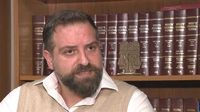Bachir Atallah, a real estate attorney from New Hampshire, claims he and his wife were detained for hours by U.S. Customs and Border Protection (CBP) at the northern border without any explanation. The couple was returning from a family visit in Canada on Sunday, April 13, 2025, when they were intercepted in Vermont.
Atallah, who has been a U.S. citizen for ten years, described the encounter as shocking and traumatic. He told NBC10 Boston, "I literally drove my car to Canada for the weekend, and on the way back, I was treated like a criminal." He recounted how a CBP agent reached for his gun and ordered him to exit the vehicle, saying, "He asked me, 'Exit the vehicle right now,' and he reached for his gun. I said, 'OK, I'm exiting the vehicle, keep your gun at your waist.'" Atallah claims he was handcuffed and had his arm twisted as he was led inside the facility, all while anxiously watching his wife, Jessica Fakhri, from the car.
Fakhri described the experience as "a shock," emphasizing the distress they both felt during the ordeal. According to Atallah, they were held in separate cells without shoes or jackets in freezing conditions. He stated, "They held us in two separate cells, and neither of us had shoes or a jacket. It was freezing." The couple was reportedly detained for five hours before being released.
While in custody, Atallah began to feel unwell, with his blood pressure reportedly rising to 153 over 112. Customs officials called for medical assistance, but Atallah declined treatment, fearing it would prolong their detention. He explained, "They're definitely going to escort me to the hospital and have an officer guard me and bring me back and start from zero." Eventually, they received medical care after returning home.
Atallah expressed frustration over the lack of communication from CBP regarding the reasons for their detention. When he asked why they were being held, he was told, "We don't know; it's the government." This lack of clarity has left him unsettled, especially as he prepares to travel to Lebanon for work shortly after the incident. He remarked, "I’m scared it’s going to happen again tonight," referring to his upcoming departure.
In a statement, CBP Assistant Commissioner Hilton Beckham labeled Atallah's accusations as "blatantly false and sensationalized," asserting that the officers acted in accordance with established protocols. Beckham stated, "Upon arrival at the port of entry, the traveler was appropriately referred to secondary inspection—a routine, lawful process that occurs daily, and can apply for any traveler." He added that officers worked to ensure that attorney-client privilege was respected during the electronic media search, and that Atallah provided written consent for a limited search of his electronic device.
Atallah, however, claims that he was coerced into allowing agents to access his email, which he argued was protected by attorney-client privilege. He recounted, "I had to, under duress, give him permission to look through my email, through my privileged information, and he made me write a statement, signed by me, saying that I gave him permission to look through the email." This has raised concerns about the treatment of legal rights for U.S. citizens under current immigration enforcement policies.
His sister, Celine Atallah, who is also an immigration lawyer, spoke out about the implications of the incident, stating, "It's not about the immigrants. It's coming to us Americans, and it's going to go after all of us." Her comments reflect a growing anxiety among citizens regarding the reach of immigration enforcement, especially as the Trump administration has been granted authority to carry out mass deportations, a key campaign promise that has resonated with a significant portion of the Republican base.
Atallah's experience has sparked discussions about the treatment of U.S. citizens by immigration authorities. Ron Abramson, a New Hampshire immigration attorney not affiliated with the case, expressed concern, stating, "Detaining people with no basis is not something America does. This sort of incident raises the question of how far will this go, and is anyone safe?" These sentiments underscore a broader anxiety about the implications of aggressive immigration enforcement policies.
As Atallah prepares for his trip to Lebanon, he is left wondering about the potential consequences upon his return. His case highlights the tension between national security measures and the rights of U.S. citizens, especially those who find themselves caught in the crosshairs of immigration enforcement.
In the wake of this incident, Atallah and Fakhri are pursuing legal action against CBP, seeking accountability for what they describe as an unjust and traumatic experience. As they navigate the legal landscape, they hope their story will shed light on the experiences of others who may find themselves similarly affected by immigration enforcement practices.









